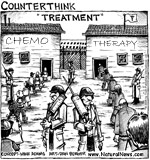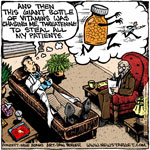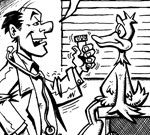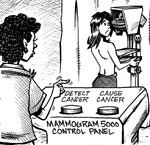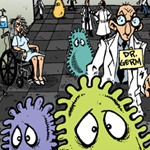Serotonin and Melatonin - The Surprising Relationship Between Two Well-Known Brain Chemicals
| Share on Facebook | Share on Twitter | Share on Google+ |
Dudley was depressed. Ever since he broke up with his fiancee and got downsized from his dream job the same week, Dudley had been in a funk that he just couldn't pull out of.
Making matters worse Dudley's depression was complicated by ever-worsening insomnia. Never one to sleep more than six hours a night, Dudley found that when bedtime came, he wanted to stay awake, and when it was time to get up and apply for jobs, he wanted to sleep.
Mental states are seldom just a matter of biochemistry, but it's fair to say that a shortage of serotonin in Dudley's brain aggravated his depression. It's also fair to say that a shortage of melatonin aggravated his sleep problems. But did you know that the shortage of serotonin is what caused the shortage of melatonin, or that this connection explains why so many people who have depression can't sleep?
The brain (and the intestines) make serotonin from the amino acid tryptophan, with the help of vitamin B6, creating a chemical known as 5-hydroxytryptophan (5-HTP) as an intermediate step.
What is the relationship between serotonin and melatonin? The brain (as well as the retinas, bone marrow, and certain white blood cells) make melatonin from serotonin. Melatonin is also a powerful antioxidant that can slow the progression of Parkinson's disease and ovarian cancer, but once it has quenched a free radical reaction to protect a cell, it is used up, and cannot be recharged. Once serotonin has been transformed into melatonin, there is no further serotonin and melatonin reaction, since there are no serotonin vs melatonin reactions and melatonin is not turned back into serotonin.
There are many supplements, such as 5-HTP, that can help your brain make serotonin. But if you taking a supplement or a medication for depression, do you also need to take melatonin? (See Serotonin and Depression Relationship).
It all depends on whether or not you have trouble sleeping. If you are already on a selective serotonin reuptake inhibitor (SSRI), ask your doctor if you might not be treated with a drug called agomelatine, which is sold under the trade names Melitor, Thymanax, and Valdoxan. This drug is not a reuptake inhibitor, but it keeps the brain from recycling 5-HTP, keeping serotonin levels higher, while it also helps the brain make more melatonin.
Especially if you have obsessive-compulsive disorder with moderate to severe depression, this medication may be better for you than any supplement. Only your doctor will know for sure.
If you don't need this medication, then you might consider adding melatonin to your supplement program. The thing to remember about melatonin is that it induces sleep-so you want to take it at bedtime, not when you need to be waking up to go to work!
Also, start with a smaller dose. Melatonin is non-toxic even in large doses, but you should only take enough to get to sleep. This is usually 1 to 3 mg, taken 1 hour before the desired bedtime. It also helps to sleep in the dark, so your brain can make its own melatonin. The slightest exposure to blue light, even if your eyelids are closed, interrupts the brain's production of melatonin.
Only one food delivers melatonin in a dosage that makes a difference to your health Montmorency cherries. If you like cherries, eat them every day. You may find that they help both depression and insomnia. (More about anxiety and insomnia).
-
Skin CareMen Skin Care
-
Free ResourcesFree eBooks
-
Every patient carries her or his own doctor inside.Albert Schweitzer
-
Featured Health Supplement"...I also suffer from mild-to-moderate depression, so several months ago as an experiment I ordered a few bottles of the Neuro-Natural Serenity formula, but never took it consistently. However, I started taking it faithfully last week at full dose and already my spirits are lifting and I have a greater clarity of mind."
Cathi, USA -

